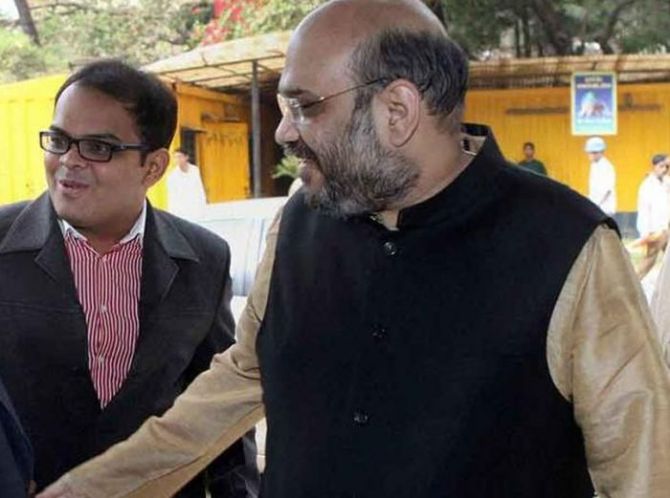While Jay Shah has warned the media against violating his fundamental right to privacy, Tushar Mehta -- his lawyer in the defamation case -- had opposed the right to privacy in the Supreme Court, points out Dr Gopal Krishna.

Additional Solicitor General Tushar Mehta, who appeared for the Unique Identification Authority of India (UIDAI) and the state of Madhya Pradesh in the Central Identities Data Repository (CIDR) of 12-digit biometric Unique Identification (UID)/Aadhaar numbers case, will represent Jay Shah, Bharatiya Janata Party President Amit A Shah's son, in the criminal defamation case which has been filed against the news portal The Wire over its report that his firm's turnover grew manifold after the BJP came to power.
As an additional solicitor general can appear in a matter between two private parties after taking due permission, Union Law Minister Ravi Shankar Prasad -- who is also the minister of electronics and information technology, the UIDAI's parent ministry -- has allowed Tushar Mehta to appear for Jay Shah in the matter of the report related to Temple Enterprise Private Ltd whose turnover increased 16,000 times between 2014-15 and 2015-16.
The criminal defamation suit has been filed against seven people including The Wire reporter Rohini Singh, editors Siddharth Varadarajan, Sidharth Bhatia and M K Venu and others in an Ahmedabad court.
In her report, Rohini Singh reproduces what Jay Shah's lawyer Manik Dogra told her: 'In view of the answers and explanations detailed above, the facts are absolutely clear and you are requested not to publish anything in this behalf, which would not only infringe my clients' privacy rights, but would also be libelous and/or defamatory' (Emphasis added).
The invoking of 'privacy rights' by Jay Shah assumes significance in the light of the August 24, 2017 verdict of the Supreme Court upholding the Right to Privacy in the UID/Aadhaar numbers case.
In that case, Tushar Mehta, then appearing for the UIDAI and the state of Madhya Pradesh, had told the Supreme Court's 9-judge Constitution Bench that 'it is neither necessary nor appropriate to recognise privacy as a fundamental right' (page 344 of the 547-page verdict). Justice S A Bobde refers to his submission before rejecting it.
According to Tushar Mehta, 'Privacy is an inherently vague and subjective concept and cannot, therefore, be accorded the status of a fundamental right. Further, codified statutory law in India already confers protection to the individual's right to privacy.'
According to him, no further expansion of the rights contained in Part III of our Constitution is at all warranted (page 344 of the verdict).
Justice R F Nariman refers to this submission before rejecting it.
The Constitution Bench found not an iota of merit in his arguments and rejected Mehta's contention.
In his response to The Wire, Manik Dogra, Jay Shah's lawyer, warned everyone in the print, electronic or digital media saying, 'If you or anyone in the print, electronic or digital media carries and/or broadcasts any defamatory and/or false imputations including those which breach his fundamental right of privacy and/or defame him, Jay Shah reserves the right to prosecute and sue such person/entity including anyone who carries or broadcasts a repetition of such libelous/defamatory statement.'
Dogra further told The Wire, 'Jay Shah is a private citizen doing his legitimate business. His business transactions are honest, legal and bona fide. Your questionnaire indicates that your intention is to drag him into a false and a manufactured controversy.'
'Any slant or imputation which alleges or suggests any impropriety on his part will not only be false but also malicious and defamatory. It will also be a breach of his fundamental right to privacy.'
'He shall, in that event, reserve the right to prosecute you for defamation and also sue you for the civil wrongs.'
Notably, opposing the recognition of 'fundamental right to privacy', Rakesh Dwivedi, the senior counsel appearing for the state of Gujarat, had argued that, 'It is only when individuals disclose certain personal information in order to avail a benefit that it could be said that they have no reasonable expectation of privacy as they have voluntarily and freely parted with such information.'
In the light of Dwivedi's contention which has been recorded in the verdict, did Jay Shah waive his right to 'reasonable expectation of privacy' if he 'voluntarily and freely parted with such information' which is quoted in The Wire report?
Isn't Jay Shah's invocation of violation of fundamental right to privacy 'premature' because the reporter has only brought to light what was already in the public domain -- as filings with the Registrar of Companies?
Dr Gopal Krishna is a public policy and law researcher and convener, Citizens Forum for Civil Liberties, which is campaigning against surveillance technologies since 2010.
He is editor of www.toxicswatch.org











 © 2025
© 2025